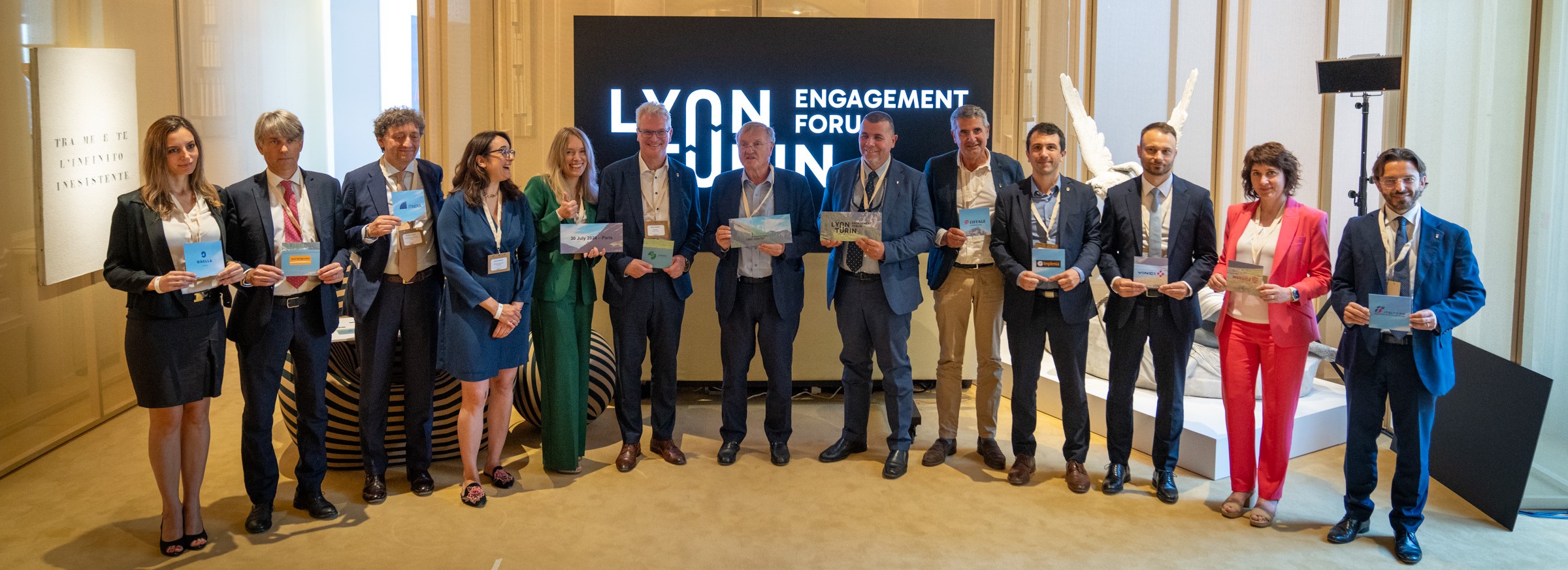Turin-Lyon: planning kicks off for construction site sustainability
Italferr at the Lyon-Turin Engagement Forum

The construction sites of the new Turin-Lyon railway become a laboratory for defining new practices and rethinking sustainability applied to large infrastructure projects. With this objective in mind, the major international companies engaged in the construction of the Mont Cenis base tunnel met in Paris, on 30 July 2024, with the bi-national promoter of the TELT Project to launch the first Lyon-Turin Engagement Forum.
The setting was Casa Italia, at the Paris 2024 Olympics, dedicated specifically to the theme of sustainability.
In attendance, besides the top management of TELT, the managers of 11 construction and engineering companies involved in the ten construction sites of the project, who put forward their projects on environmental protection and the circular economy, occupational health and safety, how to maximise benefits for the local communities and the fight against corruption.
Speaking on behalf of Italferr, the engineering company of the FS Group Infrastructure Cluster, at the Forum was Fabio Pigliacampo, Head of Strategies and Sustainability, who reiterated how sustainability is the engine that drives infrastructure development.
In particular, Italferr's commitment towards sustainable infrastructure design and construction can be an opportunity to create value and support the growth of the regions and communities interested by the works. This awareness has led Italferr to develop state-of-the-art methodologies and protocols for assessing the social and environmental sustainability of major infrastructure projects from the initial design phase.
The commitments of all the companies involved and the actions planned for the construction sites, together with the activities implemented by Italferr, have been collected in a paper called “Commitment to the construction sites of the Lyon-Turin railway line” presented at the Forum.
This is the first guideline document written jointly by contractors and clients, driven by the conviction that the stakeholders involved in one-of-a-kind infrastructure projects, like the Lyon-Turin rail line, with its far-reaching economic, political and symbolic significance, must share the same objectives of quality, efficiency and legality, but above all they should collaborate to ensure that the relevant construction sites are capable of setting an example to be followed.
To achieve such goal, the Paper identifies the best practices already in place on the construction sites and launches 8 new operational challenges that companies will measure themselves against in the coming months.
In addition to respecting the environmental management system and the commitment to safeguarding territories, biodiversity, and natural resources, the companies of the Turin-Lyon have already implemented multiple solutions:
- Technical innovation to improve worker safety in underground work, through new prototypes with remote guidance.
- Introduction of eco-responsible systems, with the use of sustainable and energy-saving materials in the construction and operation of site offices.
- Collection and closed-circuit management of water and their maximum reuse for construction site operations (construction, cleaning of vehicles, wetting of construction site roads, and cooling of machinery).
- Transparent reporting of sustainability indicators, within the life cycle of the work.
- Coordination with territorial entities to maximize the impact on communities (worker training, recruitment, management of workforce hospitality, etc.)
The 8 new actions for a sustainable construction site are divided into four areas:
Environment:
- Introduction of at least +30% of electric and low-emission construction vehicles to promote decarbonization and further reduce energy consumption during the construction of the base tunnel.
- Introduction of at least +10% of energy from renewable sources, through the exploitation of geothermal energy and the installation of solar panels.
- Participation in at least one species protection project proposed by the Public Promoter and signing of the International Convention on Biodiversity.
People:
- Introduction of an artificial intelligence system to minimize the interaction between workers and heavy machinery, thus increasing safety standards.
- Creation of a training area to prepare workers for construction site activities.
- Provision of workstations with ergonomic structures to protect workers during tunnel lining operations.
Legality:
- Participation in the creation of an ethical committee for the Turin-Lyon companies, with a whistleblowing mechanism common to all construction sites.
Territory:
- Training, in addition to the mandatory ones in synergy with territorial entities, for workers in order to enhance skills, increase safety, and train young workers.
The Lyon-Turin Engagement Forum was an opportunity to emphasise how the progress of construction sites will peak in the next few years, with 7 TBMs in operation and more than 4,000 workers directly involved, therefore highlighting the urgency of bringing together and aligning all the actors involved on the issues of sustainability and safety at work, with the aim of laying down virtuous practices in the large infrastructure sector.